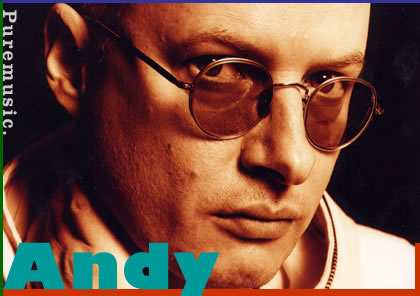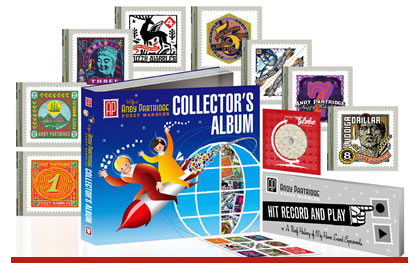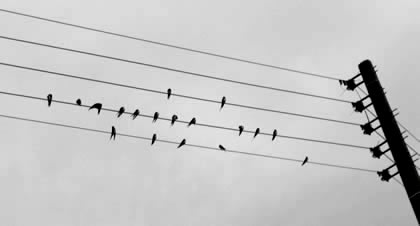
A Conversation with
Andy Partridge
Puremusic: Hello, Andy. How are you?
Andy Partridge: Hey, Frank, okay.
PM: Ah, it's lovely to speak to you. I'm calling from Nashville, as you may know.
AP: Ah, I can hear the twang of all those country guitars from here.
[laughter]
PM: Yeah, no end to them, for sure. Too few cuts, too many songwriters.
AP: [laughs] Is it still like a big thing, are people still flocking to Nashville?
PM: Even though country is in the crapper, people are still coming by the droves.
AP: Yeah, Nashville is never going to lose that cache of being the place for country.
PM: Right. And also the place to go if you're a songwriter, because country is still the genre where people are cutting more outside tunes than any other. One's got a better shot at landing a tune with an artist than you do in any other genre.
AP: Yeah. Maybe they haven't got into this greedy thing the pop world has got into where they insist that the artist has to co-write with you, which is really hampering in some cases, because it's like some footballer--like David Beckham is great at playing football, and then there's some kid who can't play football, and they strap this kid to David Beckham's leg, and they say to him, "Okay, now play football great like you usually do." Well, he's going to be hampered with a kid strapped to his leg so that the kid can take half the glory. Do you see what I mean?
PM: And in fact, that's what's gone on in Nashville in a major way. To get on a record these days, you almost have to write with the artist.
AP: Ah, that's such a scam.
PM: Oh, yeah. It's awful, because half of them can't write their way out of a paper bag.
AP: Exactly. How can you do your football with this kid tied to your leg? It's insane.
PM: And you're going to write the same love song with someone who's 20, and you've been married twice? I don't think so.
[laughter]
AP: I'll tell you, my concerns at 20 were not what they are coming up for 53.
[laughter]
PM: It's interesting that after all those years under the thumb of Virgin, now you're the head honcho of your own label [Ape House Records].
AP: Yeah, I guess so. But I can't see it ever making me enough money to have a fleet of airlines. I can't see the tail fin with the Ape face on it somehow.
[laughter]
PM: Although it is a hell of a logo. It would look good on a plane.

AP: Ape, as a company, is not making any money. In fact, the bank statement I saw for Ape last week has exactly two and a half thousand pounds profit in four years.
PM: Are you kidding me?
AP: That's not great going. So I do it for the love of it.
PM: Ah, see, I had no idea. Because I know that there are still so many XTC people out there on the globe that if the right thing is offered to them, I'm sure there's money to be made. And I really liked Fuzzy Warbles. I think it's a great offering. But I think that there are all kinds of possibilities.
AP: Did you see the collector's album?
PM: What do you mean, the Apple Box?
AP: No, no. The collector's album that goes with all the Fuzzy Warbles stuff.

PM: Well, I've only seen pictures of it, because what I got as a journalist was an advance copy, your data disc, with all the folders and files.
AP: Oh, okay, yeah.
PM: But I've heard the 100 songs.
AP: Yeah, yeah. Believe it or not, the data discs were a lot cheaper to make than sending everybody a review copy of the box set. Sending out review copies probably cost about sixty, seventy dollars a time, so...
PM: Exactly. So, yeah, I didn't quibble about it, because I was happy to get the files, and to hear the songs. I mean, what I found really fascinating were all the demos for the songs that did end up getting cut.
AP: Sure, that's part of the thrill, I guess, for people--just hearing kind of ghosts of songs that were or were not ever made flesh.
PM: Or, to people who think that way, the skeletons of songs are very interesting. Listening to "1000 Umbrellas" on acoustic guitar, I thought, "Wow, I can hear that voicing, I know how he plays it now, right..."
[laughter]
AP: Well, if you want to know, I can tell you the shapes, if you want to play it.
PM: And even, in some cases--like you said, "Well, here's the tuning, it's D6 with a drop D, and here's how it goes, and we're off." It's the track called "Mermaid Explanation."
AP: Oh, right, right. Well, I have to do that for myself, you see, because I don't write music. And any way I can remember what the hell I'm doing--I have to sing stuff into cassette machines or tell myself the tuning, or usually tell myself the chords I'm going to play, in my own kind of language, because I don't know the names of a lot of the chords I play. So any way I can get that down is good, because I have no musical training, or anything like that.
PM: I hear you. Yeah, they won't let me do charts for my songs. They say, "No, no Frank. Just play the song. We'll write the chart. You're just going to screw it up anyway."
AP: Yeah, exactly. I mean, it means nothing to me, they're just sparrows on telegraph wires. That's not my language.
PM: [laughs]

print (pdf) listen to clips puremusic home